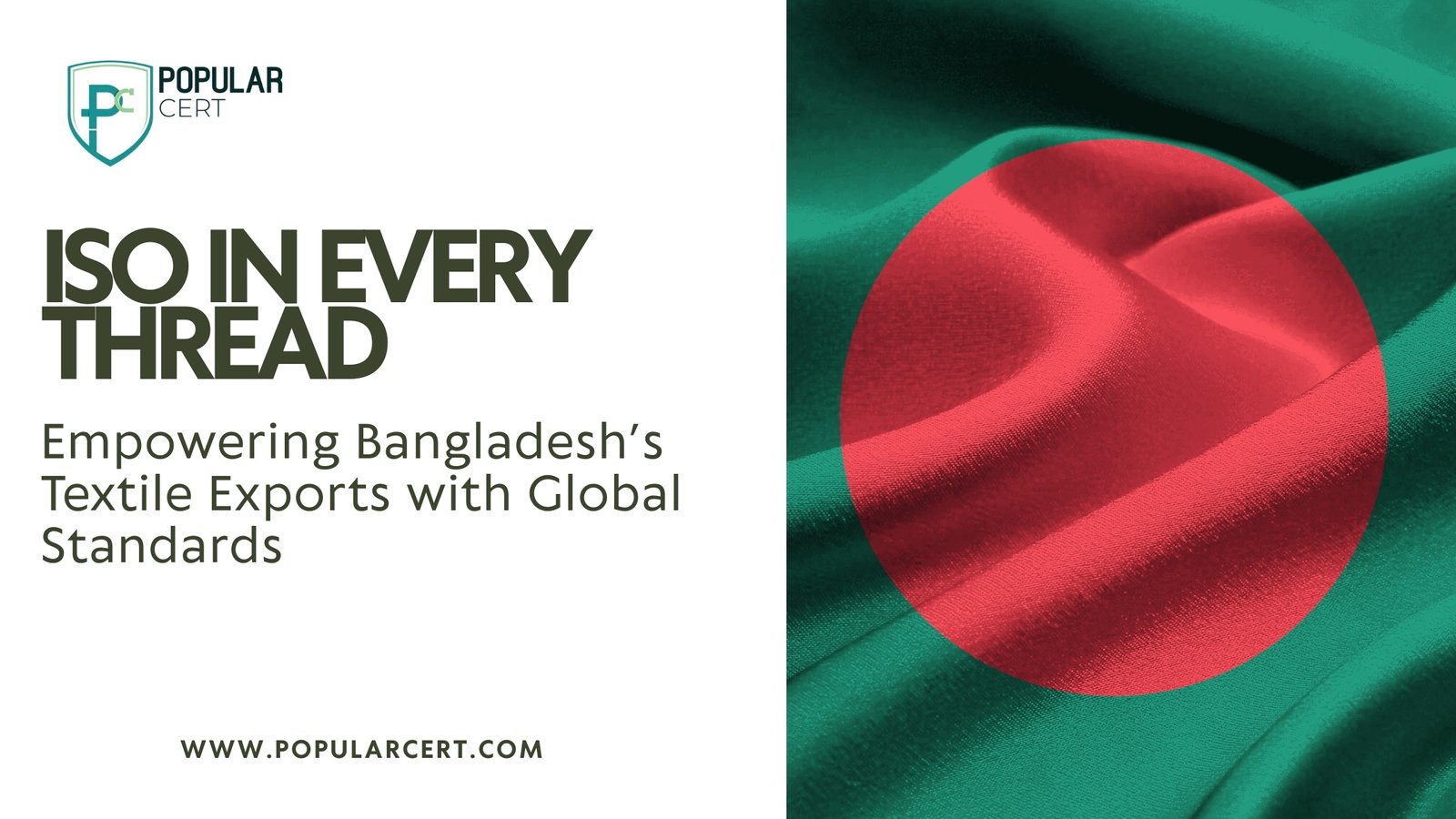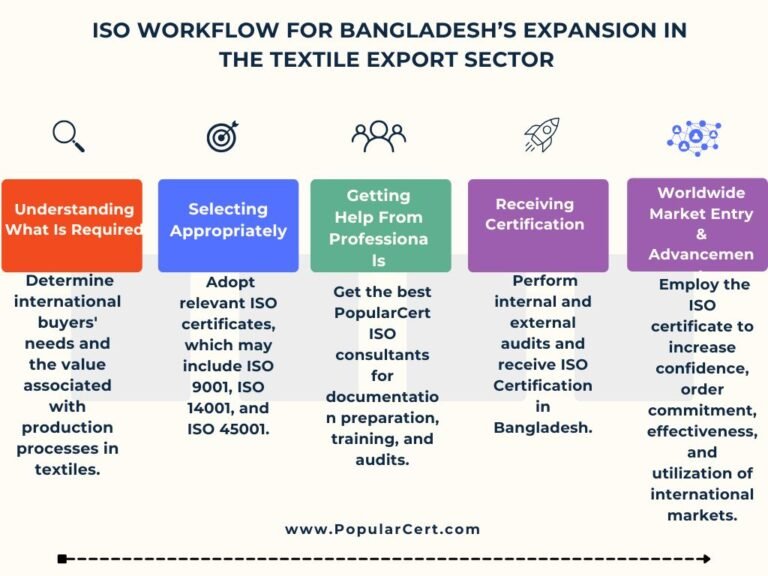ISO in Every Thread: Empowering Bangladesh’s Textile Exports with Global Standards

Bangladesh is recognized worldwide for its contribution to the textile and garment industries. They provide many international businesses with well-made clothes and fabrics. However, businesses need to adapt to worldwide frameworks to remain competitive—this is where ISO certification in Bangladesh comes in handy.
Meeting ISO standards guarantees reliability, safety, and efficiency, which increases the international appeal of Bangladeshi textiles. In this article, we will discuss the impacts of ISO certification on the textile industry, the reasons for its need, and how PopularCert—one of the leading ISO consultants in Bangladesh—supports organizations in attaining the certification
Understanding the Importance of ISO Certification for Bangladesh's Textile Industry
Bangladesh exports textiles and garments worth $36 billion annually, contributing over 80% of the country’s export earnings. This is exceptionally important for the nation’s economy. However, international buyers require compliance with standards such as:
- ISO 9001 (Quality Management) – Certification ensures operational and product consistency.
- ISO 14001 (Environmental Management) – Certification enables an organization to manage and reduce waste.
- ISO 45001 (Occupational Health & Safety) – Certification improves worker safety and protects them from workplace hazards.
With these certifications worldwide, textile manufacturers would:
- Increase opportunities for exports → Buyers prefer ISO-certified suppliers.
- Improve operating efficiency → Production errors and waste is greatly reduced.
- Boost the Reputation of the Brand → International clients begin to trust the business.
- Fulfill ESG (Environmental, Social, and Governance) obligations → Legal and regulatory business requirements are met.
In what ways does ISO Certification enable growth in Bangladesh’s Textile Industry?
- Achieving Global Buyer Standards
Global suppliers are from well-known brands such as H&M, Zara, or Walmart and require their partners to hold ISO certification. Without it, Bangladeshi producers are likely to lose out on contracts to India, Vietnam, or China.
- Enhanced Quality Control
ISO 9001 enables factories to achieve a set of standards that ensure their level of service quality and customer satisfaction. Fewer complaints mean more satisfied customers, leading to repeat orders.
- Minimizing Adverse Effects on the Environment
The shift towards environmentally friendly fashion has caused a rise in demand, which expands opportunities for textile companies. ISO 14001 certification enables companies to minimize pollution, reduce water consumption, and make other eco-friendly efforts.
- Social Responsibility: Protecting Workers & Ensuring Ethical Treatment
Workplace safety is improved through ISO 45001, reducing workplace accidents and maintaining legal compliance with labor regulations, which is a critical focus for Western consumers.
Types Of Certification
- ISO Certification
- ISO 9001 Certification
- ISO 14001 Certification
- ISO 45001 Certification
- ISO 22000 Certification
- ISO 27001 Certification
- ISO 17025 Certification
- ISO 13485 Certification
- ISO 20000-1 Certification
- ISO 22301 Certification
- ISO 50001 Certification
- ISO 37001 Certification
- IATF 16949 Certification
- ISO 29001 Certification
- ISO 31000 Certification
- ISO 20121 Certification
- ISO 10002 Certification
- ISO 41001 Certification
Get Free Consultation
Our Clients


















Uncommon ISO Standards in the Bangladesh Industry
- ISO 22301 – Business Continuity Management Systems
Ensures businesses can continue operations during disruptions like natural disasters or supply chain failures. Crucial for factories and exporters facing power or logistics issues. - ISO 50001 – Energy Management Systems
Helps industries reduce energy use and costs. Useful in high-power sectors like cement, steel, and textile dyeing. - ISO 31000 – Risk Management
Guides companies on how to manage financial, safety, and operational risks. Suitable for large-scale manufacturers and investment-driven projects. - ISO 37001 – Anti-Bribery Management Systems
Builds trust with global partners by reducing corruption risks. Increasingly important in export, construction, and government contracting sectors. - ISO 22000 – Food Safety Management Systems
Although more common in food sectors, it’s underused in Bangladesh’s agro-processing and seafood export industries despite global demand. - ISO 45003 – Psychological Health and Safety at Work
A new standard focusing on mental well-being in the workplace, highly relevant for the evolving labor policies in garment and tech industries. - ISO 13485 – Medical Devices Quality Management
Critical for companies entering medical equipment manufacturing, a growing niche in Bangladesh.
ISO Certified vs. Uncertified Textile Exporters in Bangladesh
Criteria | ISO Certified Exporters | Uncertified Exporters |
Quality Assurance | Consistent product quality through ISO 9001 standards | Quality often varies; prone to customer complaints |
Buyer Confidence | International buyers prefer certified exporters | Limited access to top-tier global clients |
Environmental Compliance | Follow ISO 14001 for sustainable practices | May face rejection in eco-conscious markets |
Health & Safety | Ensure worker safety with ISO 45001 | Higher risks of accidents and labor disputes |
Market Access | Easier entry into EU, US, and high-standard markets | Restricted to low-regulation or regional buyers |
Business Reputation | Seen as reliable and globally competitive | May struggle to build international credibility |
Risk & Cost Control | A systematic process reduces waste and errors | Higher chances of returns, rework, and operational losses |
Compliance with Laws | Meet legal and customer-specific standards | Risk of non-compliance penalties |

How PopularCert Helps Businesses Get ISO Certified
At PopularCert, we ease the certification burden for Bangladeshi textile companies. Here’s our support framework:
🔹 Step 1: Gap Analysis – We evaluate your existing workflows and develop plans to improve them.
🔹 Step 2: Documentation & Training – We develop required documents and training materials to get your staff ready.
🔹 Step 3: Implementation Support – We assist you in meeting prescribed ISO standards.
🔹 Step 4: Audit & Certification – We provide you with consultancy in the final audit and achieving certification.
We carry out ISO consulting in Bangladesh and ensure that the certification process is smooth, quick, and inexpensive.
Conclusion:
For textile businesses in Bangladesh, ISO certification is no longer optional. Industry standard IGN:238, competing in the global market, is a prerequisite. The adoption of ISO standards helps improve quality, sustainability, and safety at the workplace and enhances international market appeal.
PopularCert offers ISO certification solutions and helps achieve compliance with global standards. If you are poised to elevate your textile exports, contact us now for professional ISO consulting.
GET A FREE CONSULTATION NOW
FAQ
Why is ISO certification important for textile exporters in Bangladesh?
It boosts product quality, global trust, and access to international markets.
. Which ISO standards are most relevant to the textile industry?
ISO 9001 (quality), ISO 14001 (environment), and ISO 45001 (worker safety).
How long does it take to get ISO certified in Bangladesh?
With expert help from PopularCert, it usually takes 4–8 weeks.
Is ISO certification expensive for small textile companies?
No, PopularCert offers cost-effective solutions tailored to all business sizes.
